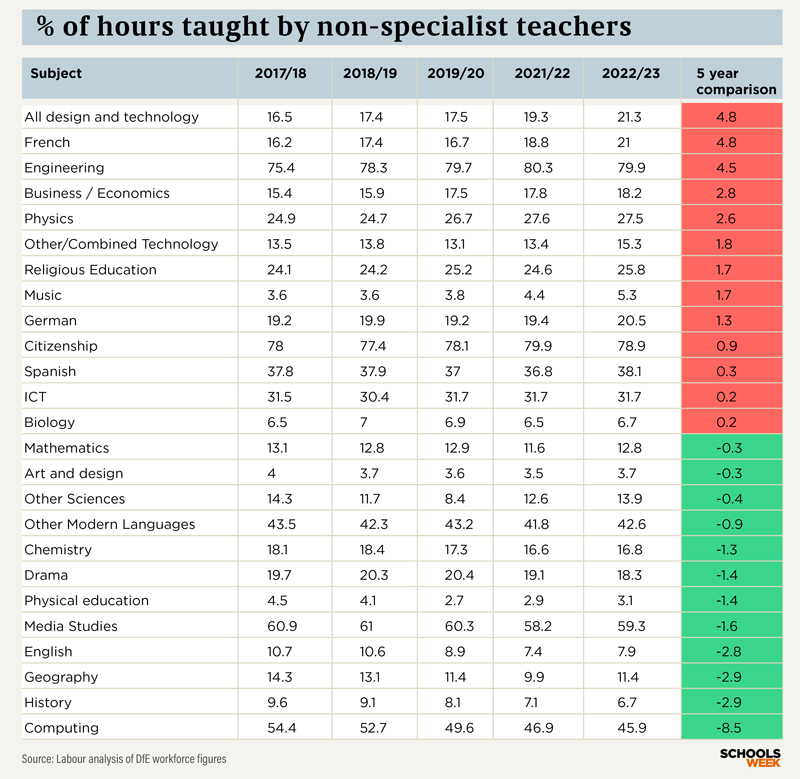Nearly four in five lessons in some subjects are now taught by non-specialist teachers, new analysis of government figures suggests.
A Labour party analysis of school workforce census figures looked at the proportion of hours across 30 secondary subjects taught by a teacher without a relevant degree.
Half had seen a rise in classes taught by teachers without a relevant degree in the subject.
It comes amid a continuing recruitment crisis in the sector, with predictions that ministers are on track to recruit less than half of the required secondary trainee teachers for 2023-24.
Labour has previously pledged to fund more teachers by ending private schools’ tax status.
Here are the key findings:
1. Half of secondary subjects see rise in non-specialist hours
Over the last five years, half of secondary subjects saw a rise in the number of hours taught by non-specialists.
Design and technology subjects and French saw the biggest rises – at 4.8 percentage points – between 2022-23 and 2017-18.
This academic year, 21.3 per cent of hours of design and technology lessons were taught by non-specialist teachers, according to the census data.
This compares to 16.5 per cent five years ago.
Over a fifth of French teaching hours were by non-experts, compared with 16.2 per cent five years ago.
However, plenty of subjects also reduced their reliance on non-experts meaning that, overall, the picture hasn’t changed much.
In 2017-18, 25.2 hours of all secondary subjects were taught by non experts, compared to 25.3 in 2022-23.

Figures are not available for 2020-21 due to Covid. Design and technology subjects include resistant materials, textiles, food tech, graphics and electronics.
2. Nearly 80 per cent of some classes taught by a non-specialist
The subjects most often taught by non-experts were engineering and citizenship.
Nearly 80 per cent of all hours of both subject taught this year were by non-specialists.
Both were also the most likely to be taught by a teacher without a relevant degree five years ago.
However, while citizenship saw an 0.9 percentage point increase in non-specialist hours over the same timeframe, engineering saw a relatively large 4.5 percentage point rise.
3. Computing suffers despite government tech push
Despite the government’s push to “strengthen the digital education pipeline” as part of its digital strategy, the figures indicate a lack of specialist computing teachers.
More than two-fifths – 45.9 per cent – of computing hours taught in secondary schools were by non-specialists last year.
Meanwhile, one in three (31.7 per cent) key stage three ICT hours were taught by a non-specialist.
This chimes with current recruitment struggles in the subject.
Last year, the Department for Education (DfE) only met 35 per cent of its own target for trainee computing teachers.
However things are getting a bit better. In 2017-18, the proportion was 54.4, which is 8.5 percentage points higher than this year.
4. Other shortage subjects also hit …
Unsurprisingly, other subjects with teacher shortages also saw high proportions of classes being taken by non-experts.
The DfE only met 20 per cent of its target for trainee physics teachers last year.
Labour’s analysis shows this year, nearly one in three (27.5 per cent) of hours of the subject taught in secondaries were by non-specialists.
Recruitment of modern languages teachers has also languished – the DfE met 36 per cent of its target for trainees last year.
The workforce stats show nearly two-fifths (38.1 per cent) of Spanish hours were delivered by a teacher without a relevant degree.
For French and German, the figures were 21 per cent and 20.5 per cent, respectively.
5. … but others see improvement
Commenting on the analysis, shadow education secretary Bridget Phillipson accused the government of creating “the perfect storm” in recruitment and retention.
“Labour knows that to break down the barriers to opportunity that our young people face, we need high and rising standards in state schools,” she added.
But despite the bleak outlook for many subjects, 12 have seen the percentage of hours taught by non-specialists fall in the last five years.
This includes core subjects. Fewer hours of English were taught by non-experts this year compared to 2017-18 – a fall of 2.8 percentage points.
The proportion of hours of history and geography taught in secondary schools also fell by 2.9 percentage points.









Your thoughts